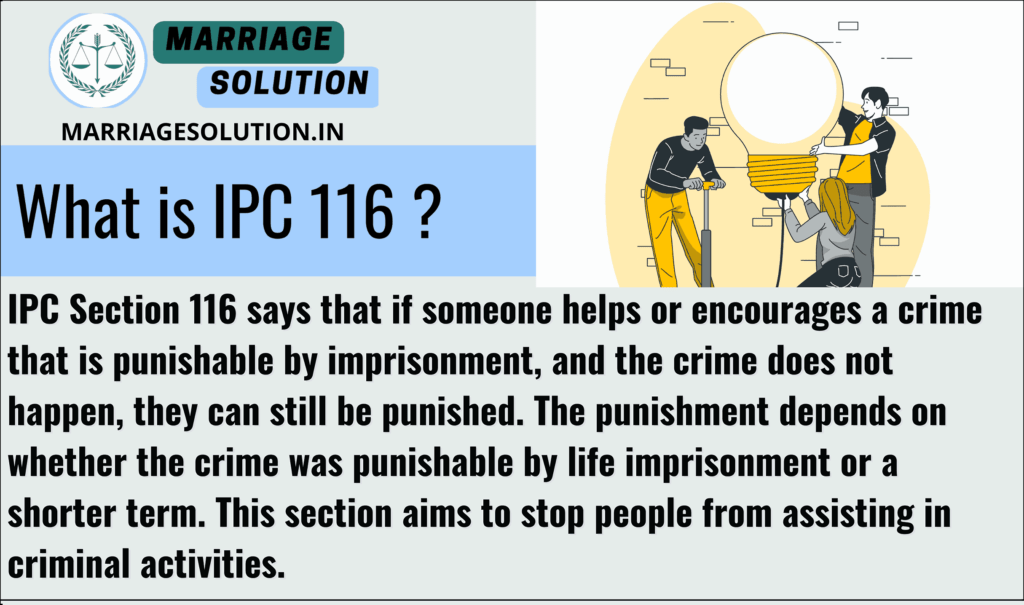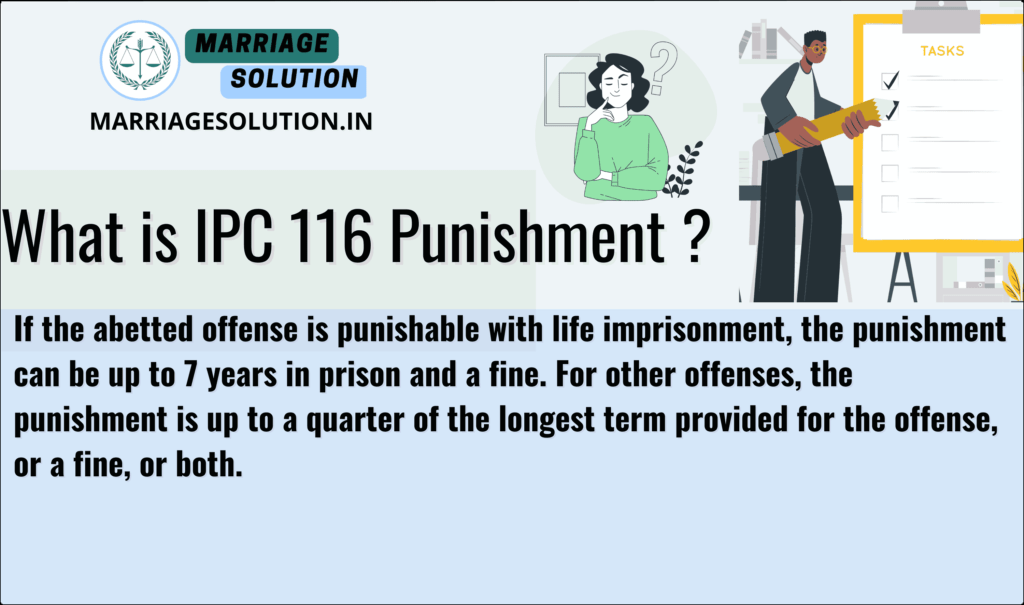Introduction of 116 IPC
Indian Penal Code (IPC) Section 116 deals with abetment of an offense punishable with imprisonment. This section is important because it addresses situations where someone helps plan or encourage crimes that can lead to jail time, even if those crimes don’t actually happen. It shows that even attempting to assist in such crimes is punishable by law.
- Introduction of 116 IPC
- What is IPC Section 116 ?
- IPC Section 116 Overview
- 116 IPC Punishment
- 116 IPC bailable or not ?
- Section 116 IPC case laws
- Section 116 IPC in short information
- 105 IPC FAQs
- If you need support with court proceedings or any other legal matters, don’t hesitate to reach out for assistance.
What is IPC Section 116 ?
IPC Section 116 says that if someone helps or encourages a crime that is punishable by imprisonment, and the crime does not happen, they can still be punished. The punishment depends on whether the crime was punishable by life imprisonment or a shorter term. This section aims to stop people from assisting in criminal activities.

IPC Section 116 Overview
IPC 116 pertains to the abetment of offenses that are punishable with imprisonment. It ensures that those who encourage or aid in committing a crime, but where the crime is not actually committed, still face legal consequences. The section serves to punish the intent and attempt to commit a crime.
Detailed Explanation of IPC 116 in Six Key Points
1. Understanding Abetment
- Abetment involves instigating, engaging in conspiracy, or intentionally aiding someone to commit an offense.
- Encouraging someone to commit theft, but the theft does not occur.
2. Scope of IPC 116
- Applies to the abetment of offenses punishable with imprisonment, excluding those with death or life imprisonment.
- Ensures instigators are punished even if the offense is not completed.
3. Punishment Provisions
- If the offense is not committed, the abettor faces half the maximum punishment of the intended offense.
- The punishment underscores the seriousness of instigating criminal acts.
4. Exceptions and Enhancements
- Does not apply if the principal offense is punishable with death or life imprisonment.
- If harm is caused due to the abetment, the punishment may be enhanced.
5. Judicial Interpretation
- Case Law: Courts have interpreted this section to emphasize the intent and actions of the abettor.
- Precedents: Key cases illustrate the application and limitations of IPC 116.
6. Bailability and Trial
- Generally non-bailable, meaning bail is not a right but subject to judicial discretion.
- Usually tried by a magistrate, ensuring a fair judicial process.
116 IPC Punishment
If the abetted offense is punishable with life imprisonment, the punishment can be up to 7 years in prison and a fine. For other offenses, the punishment is up to a quarter of the longest term provided for the offense, or a fine, or both.

116 IPC bailable or not ?
Whether IPC 116 is bailable or not depends on the nature of the offense that was abetted. If the abetted offense is bailable, then IPC 116 would generally be bailable. If the abetted offense is non-bailable, then IPC 116 would typically be non-bailable.
Section 116 IPC case laws
Detailed Explanation of IPC 116 Case Laws
1. Case Law 1: Abetment without Execution
- Facts: The accused encouraged someone to commit a robbery, but the crime was not committed.
- Legal Point: Even without execution, abetment was established.
- Judgment: The accused was punished under IPC 116.
- Significance: Reinforces punishment for encouraging crimes.
- Outcome: Imprisonment and fine imposed.
- Key Learning: Intent to abet is punishable even if the crime is not committed.
- Conclusion: Deterrence against planning crimes.
- Implications: Legal deterrent against aiding criminal activities.
2. Case Law 2: Conspiracy to Murder
- Facts: The accused conspired to murder but the murder did not happen.
- Legal Point: Conspiracy and abetment were proven.
- Judgment: Guilty under IPC 116.
- Significance: Conspiracies can lead to punishment even if they fail.
- Outcome: Significant prison term.
- Key Learning: Serious conspiracies attract severe penalties.
- Conclusion: Discourages dangerous conspiracies.
- Implications: Strict stance on planned violent crimes.
3. Case Law 3: Encouraging Theft
- Facts: The accused encouraged a minor to steal.
- Legal Point: Abetment was proven despite the theft not occurring.
- Judgment: Convicted under IPC 116.
- Significance: Protects minors from being used for crime.
- Outcome: Fine and counseling order.
- Key Learning: Protects vulnerable populations.
- Conclusion: Emphasis on deterring exploitation.
- Implications: Focus on preventing crime initiation.
4. Case Law 4: Failed Bribery
- Facts: The accused attempted to bribe an official, but the bribe was not accepted.
- Legal Point: Attempted bribery is abetment.
- Judgment: Convicted and fined.
- Significance: Corruption prevention.
- Outcome: Heavy fine imposed.
- Key Learning: Attempts to corrupt are punishable.
- Conclusion: Deterrence against corruption.
- Implications: Strengthens anti-corruption measures.
5. Case Law 5: Abetment of False Evidence
- Facts: The accused encouraged someone to give false evidence.
- Legal Point: Abetment of perjury.
- Judgment: Convicted under IPC 116.
- Significance: Upholds judicial integrity.
- Outcome: Imprisonment imposed.
- Key Learning: Protects the judicial process.
- Conclusion: Ensures truthful testimonies.
- Implications: Safeguards legal proceedings.
6. Case Law 6: Encouraging Assault
- Facts: The accused incited a person to assault another.
- Legal Point: Abetment of assault proven.
- Judgment: Punished under IPC 116.
- Significance: Prevents violence.
- Outcome: Short prison term.
- Key Learning: Discourages incitement to violence.
- Conclusion: Promotes non-violence.
- Implications: Legal protection against violence.
7. Case Law 7: Abetment in Fraud
- Facts: The accused helped plan a fraud that was not executed.
- Legal Point: Planning fraud is abetment.
- Judgment: Guilty under IPC 116.
- Significance: Prevents economic crimes.
- Outcome: Fine and community service.
- Key Learning: Prevents financial crimes.
- Conclusion: Protects economic stability.
- Implications: Deters financial crime planning.
8. Case Law 8: Attempted Smuggling
- Facts: The accused encouraged smuggling but it was foiled.
- Legal Point: Abetment of smuggling proven.
- Judgment: Convicted under IPC 116.
- Significance: Safeguards against illegal trade.
- Outcome: Imprisonment and fine.
- Key Learning: Prevents illegal economic activities.
- Conclusion: Upholds law and order.
- Implications: Deters cross-border crimes.
9. Case Law 9: Incitement to Riot
- Facts: The accused incited a riot that did not occur.
- Legal Point: Abetment of riot established.
- Judgment: Punished under IPC 116.
- Significance: Maintains public peace.
- Outcome: Fine and probation.
- Key Learning: Prevents public disorder.
- Conclusion: Ensures social harmony.
- Implications: Deters public disturbances.
10. Case Law 10: Encouraging Drug Trafficking
- Facts: The accused encouraged drug trafficking that was not carried out.
- Legal Point: Abetment of drug trafficking.
- Judgment: Convicted under IPC 116.
- Significance: Prevents drug crimes.
- Outcome: Long prison term.
- Key Learning: Protects society from drug abuse.
- Conclusion: Strong deterrence against drugs.
- Implications: Safeguards public health.
Section 116 IPC in short information
| Offence | Definition | Punishment | Bailable or Not |
|---|---|---|---|
| Abetment of an offense punishable with imprisonment, if the offense is not committed | Instigating, conspiring, or aiding someone to commit an offense punishable with imprisonment | * Up to 7 years and fine (Life imprisonment cases) * Up to 1/4 of longest term and/or fine (Other cases). | Non-bailable |
105 IPC FAQs
What is the essence of IPC 116?
IPC 116 deals with punishing those who abet an offense that is punishable with imprisonment if the offense is not actually committed.
What is the punishment under IPC 116 if the offense is not committed?
The abettor faces half the maximum punishment prescribed for the intended offense.
What happens if harm is caused due to the abetment under IPC 116?
The punishment can be more severe if harm is caused.
Is IPC 116 bailable?
IPC 116 is generally non-bailable, meaning bail is subject to judicial discretion.
If you need support with court proceedings or any other legal matters, don’t hesitate to reach out for assistance.
Court or any other marriage-related issues, our https://marriagesolution.in/lawyer-help-1/ website may prove helpful. By completing our enquiry form and submitting it online, we can provide customized guidance to navigate through the process effectively. Don’t hesitate to contact us for personalized solutions; we are here to assist you whenever necessary!
